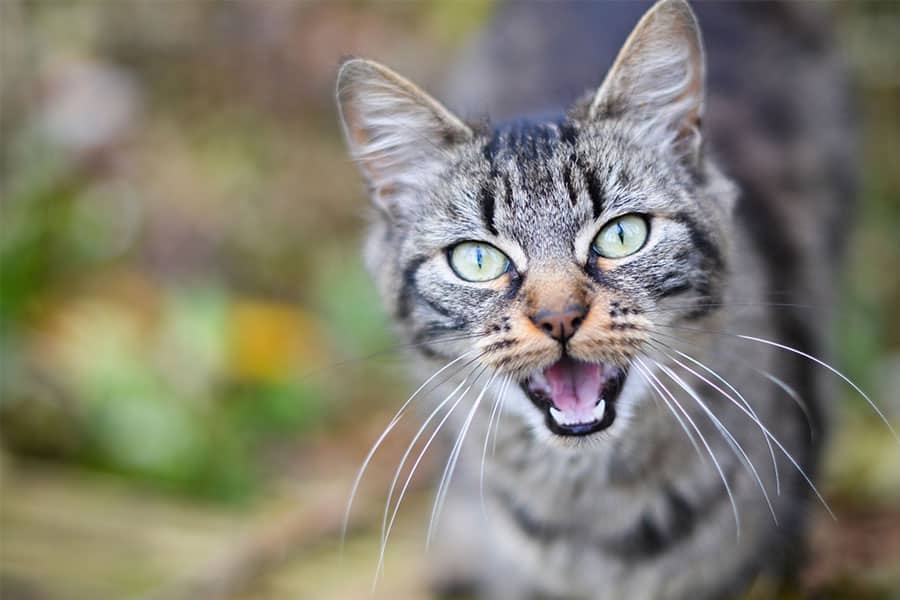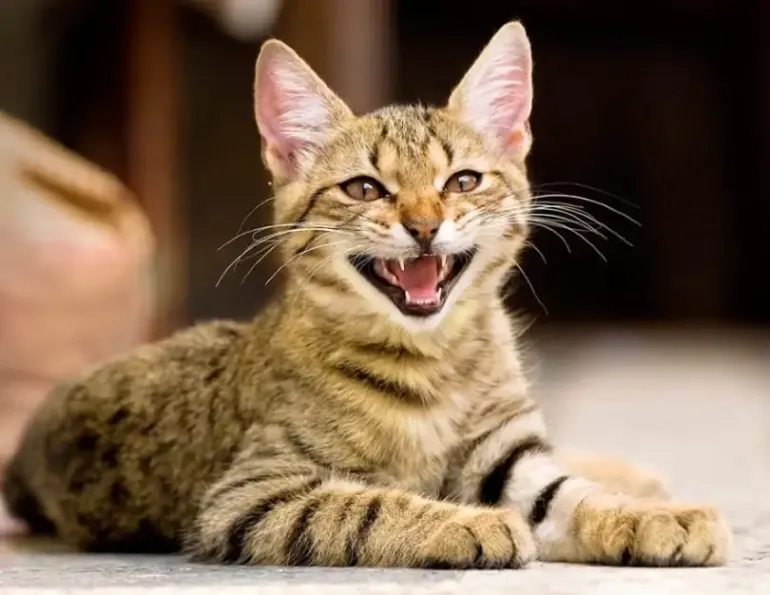Excessive vocalisation in cats

Does your cat "talk"? When cats want to talk to us, they make noises like meowing. This is how they tell us about everything from pain to conversations to being alone. Some cats make too many noises, which keeps their owners up at night and makes the whole house more stressful. Find out more about what your cat says when he "talks" to you below.
What makes cats meow?
Cats meow to talk to each other. Each cat is trying to say something that is specific to their needs, even if some are more "talkative" than others. When they do this, they might be showing feelings like happiness, stress, fear, playfulness, or loneliness. Cats can make at least 16 different sounds. Cats make some sounds with their mouths open and then shut as they make them, like the meow. Some are made with the mouth shut, like the purr. For some, like the hiss, the mouth is open for a long time. A cat will almost always meow or make other sounds when it wants attention. Some, like screaming, are more obvious ways of showing defense. Last but not least, sounds like purring are usually made when a cat wants to be with other cats, but they can also be heard when a cat is scared, like when it is at the vet's office.
Excessive vocalization in cats can be attributed to various factors:
1. Medical Issues:
- Pain, discomfort, or illness can lead to increased vocalization as a way for the cat to communicate their distress.
2. Attention-Seeking Behavior:
- Cats may become vocal when they are seeking attention, whether it's for play, food, or companionship.
3. Stress or Anxiety:
- Changes in the environment, such as moving to a new home or the introduction of a new pet, can lead to increased vocalization.
4. Boredom:
- Cats that lack mental and physical stimulation may resort to excessive vocalization as a way of expressing their boredom.
5. Hunger or Thirst:
- Cats may become more vocal if they are not receiving regular meals or if they are not provided with fresh water.
If your cat's behavior changes or gets out of hand, you should make an appointment with its vet right away. Your cat could be in pain, hungry, bad, thirsty, or worried. Cats can make too many noises if they have an endocrine, orthopedic, neoplastic (cancerous), or metabolic problem. Your vet will check out your pet's health and may suggest tests. If the vet says your cat is healthy, you can decide that the meowing is just bad behavior. When cats meow, their owners often reward them by petting, feeding, or playing with them. This can be a factor that keeps people from speaking too much. Let's say your cat meows and you feed it. It will probably meow again when it's hungry. Once your cat has learned that meowing gets your attention many times, it will likely meow longer and louder if you don't feed it right away. What's the harm? It has worked in the past. It's possible that you missed it. Anyone who has lived with a cat knows how persistent they can be and how fast their meowing can get annoying.

What should I do if my cat's meowing gets too loud?
If your vet says your cat is healthy, you can start to change his behavior by making changes to his surroundings and teaching him new things. First, try to figure out what your cat wants to say. Think about all the times it has meowed before. What were you going to do? Did you let it out by opening the door? Did you give it food? You might have taken away its favorite toy. You have encouraged your cat to behave in this way if you can remember times when you reacted in this way. If that's the case, don't pay attention to the meowing at first. Try not to answer it at all. If you have to, leave the room.
Next, give your cat treats when it is quiet. What your cat wants should be given after it stops meowing for a few seconds. This is a must if you want to stop your cat from meowing too much.
You should give cats that are meowing for food or attention a lot of things to do and make sure they can safely get to a screened-in porch or patio. If your cat is meowing around meals, try giving it food from an automatic feeder that is set to a certain time. There's also the option of leaving food in toys all day. If you take away the food from the cat, it will meow less about food.
Next, think about where you are. Have you changed your plans? It's possible that your cat used to be able to get into the room with the best window for watching birds but is now kept out of that room. He may have slept with you before, but the door to your bedroom is now shut. These kinds of things make our cats stressed, which can lead to them making too many noises. If that sounds like your cat, try to reduce its stress by adding things to its surroundings that are fun and interesting, like toys, hiding spots, cat trees, high places to rest, and multiple feeding and watering stations. Also, try to give it what it used to have (like a great view out the window) in a different place so that it is happy.
How can I stop making too many noises?
The best way to keep your cat from vocalizing too much is to not praise it when it does. Cats that mew as kittens will howl as adults, so don't encourage any sounds that you don't want to start up again.
1. Consult a Veterinarian:
- If your cat's vocalization suddenly increases or if it is accompanied by other concerning behaviors, it's important to consult a veterinarian. They can rule out any potential medical issues.
2. Provide Enrichment:
- Offer a stimulating environment with interactive toys, climbing structures, and puzzle feeders to keep your cat mentally and physically engaged.
3. Establish Routine:
- Cats thrive on routine. Providing regular feeding times, play sessions, and quiet time can help reduce anxiety and excessive vocalization.
4. Create a Calm Environment:
- Ensure your cat has a safe and comfortable space where they can retreat and feel secure.
5. Consider Spaying or Neutering:
- If your cat is not already spayed or neutered, this procedure can help reduce mating-related vocalization.
Remember, patience and understanding are crucial when addressing excessive vocalization in cats. By identifying the underlying cause and providing appropriate care and attention, you can help your feline friend lead a happier, more contented life.




